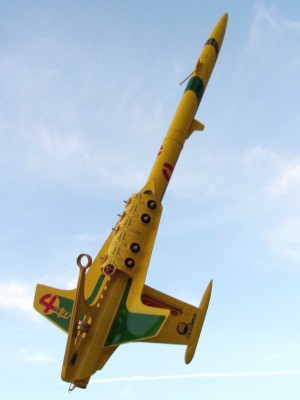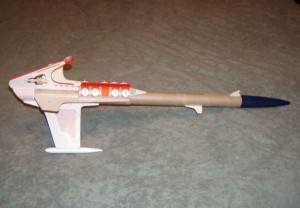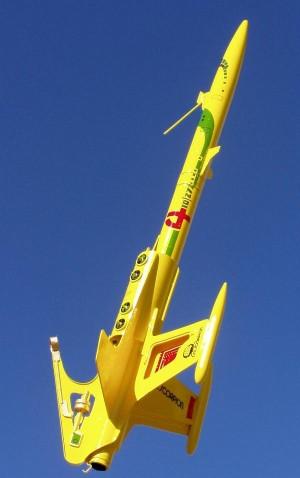| Construction Rating: | starstarstarstarstar |
| Flight Rating: | starstarstarstarstar |
| Overall Rating: | starstarstarstarstar |
| Manufacturer: | Centuri |
 Brief:
Brief:
Single stage model rocket that recovers with a dual parachutes in a unique
level configuration.
Almost a year or more ago I downloaded the instructions for Centuri's S.S.V. Scorpion from the JimZ web site. Of course I thought it was one of the most impressive kits from the Centuri Super Kit series. After reviewing the instructions, I put them aside because a large portion of the kit was made from cut out poster board, which was a process I was not interested in duplicating at the time. Not until the Master of Oatlander Research Laboratories and fellow Classic Rocketeer challenged me to try it did I finally return to the instructions with a serious intent to make an effort to clone the kit. Throughout the process I was forced to scratch build and substitute for items no longer available. I feel that I ended up with the most challenging cloned kit I have attempted and rewarded with my most satisfying results.
Construction:
Packaging? What packaging? Their ain't no stinking packaging. This is
scratchbuilding a clone.
 First step is
download the very large instructions from JimZ's web site. All templates are
included in the instructions. I then visited the local Hobby Lobby to purchase
some Picture matting board which is approximately .055" thick. This is
what I used to cut most of the items from that were included in the original
fiber cards in the kit. Transferring the shapes were accomplished with good old
carbon paper. Below is a parts list and items used to substitute.
First step is
download the very large instructions from JimZ's web site. All templates are
included in the instructions. I then visited the local Hobby Lobby to purchase
some Picture matting board which is approximately .055" thick. This is
what I used to cut most of the items from that were included in the original
fiber cards in the kit. Transferring the shapes were accomplished with good old
carbon paper. Below is a parts list and items used to substitute.
- 1 NC-56 Nose cone
- 1 Plastic Connector (available from Moldin Oldies, I scratchbuilt mine)
- 2 ST-5 Body Tubes 2.5" (BT-5)
- 1 ST-20 Body Tube 3.0" (BT-20 or Magnum "D" conversion with BT-50)
- 1 ST-56 Body Tube 6.25" (BT-56 Red Arrow Hobbies or Totally Tubular)
- 1 ST-56 Body Tube 7.0" (BT-56 Red Arrow Hobbies or Totally Tubular)
- 1 ST-56 Body Tube 8.0" (BT-56 Red Arrow Hobbies or Totally Tubular)
- 1 ST-20 Body Tube 5.0" (BT-80 Split and trimmed to the correct diameter, explained later)
- 1 Launch Lug .25" long, 5/16" diameter (Substituted a standard Estes Maxi Launch Lug)
- 1 Launch Lug 8" long, 7/32" diameter
- 1 Coupler HTC-13 (BT-56 Coupler Red Arrow Hobbies)
- 1 TR-7 Thrust Ring .4" long (Standard thrust ring for 18mm Motor or substitute a 24mm thrust ring)
- 3 TR-7 Thrust Rings 3/16" long (Trim 3 standard 18mm Thrust rings)
- 1 EL-1 Engine lock (Standard Estes Engine Hook)
- 2 Die-Cut Fiber Sheets .055" Thick (Picture Matting board or 1/16" balsa)
- 1 Die-Cut Fiber Sheet 110lb (gloss cardstock)
- 1 Shock Cord .125" x 38" (Available in your local sewing aisle)
- 2 20" Parachutes
- 128" of Shroud Line
Instructions are clear and easy to follow. The most challenging part is cutting all the items from the thick picture matting board. After the first two items were cut using a razor knife, my hand was sore and I knew I needed too explore an alternate method. I ended up cutting everything out with a scroll saw and spiral blade. I then soaked all matting board parts in thin CA to stiffen them. After that I cleaned the edges of the parts on a belt sander. The instructions also suggest cutting these parts from 1/16 sheet balsa. I chose not to use balsa because of it's lack of durability.
The ST-20 offered another problem in that a good substitute was no longer available. After a long effort of looking for a substitute, I decided to split a BT80 lengthwise and trim to the proper diameter. I was not concerned about joining or hiding the seam because the seam would join against the wall of the inner BT-56, and the seam could be hidden underneath the long 8" launch lug.
Speaking of 8" launch lug, that also proved to be a problem. Launch lugs are easy to get, but not in 8" lengths. Again Hobby Lobby to the rescue. I purchased a pack of 3/16" x .014 seamless aluminum tube in 12" lengths. Packs of three cost $1.99 and are extremely light weight. Inside diameter works with an 1/8" launch rod. Care in cutting will provide an excellent substitute.
The rare plastic coupler is available from Moldin' Oldies, or in my case I scratch built it along with the baffle coupler from several BT-56 tube sections.
 Finishing:
Finishing:
I though building would be the most difficult part of cloning this classic kit.
Instead finishing it was the most difficult step in the building process. I
first sprayed every thing with three coats of a primer/sealer paint. My
personal favorite is Kilz. I then sanded this before painting with a finishing
color. I chose to use bright yellow Krylon. With all the difficult hidden areas
and complex designs, I found it very difficult to get a good coating without
exposing myself to runs. In the end I used a full can and sanded a few
embarrassing runs away.
For decals, I printed my own on inkjet decal paper available from several vendors on the internet. Application again proved challenging because when working with large decals care is needed to avoid stretching of the decal. Stretching will result in color separation. However, big decals trap a lot of air and water that need to be worked out. Thus the dilemma, remove the bubbles and risk stretching or accept the occasional bubble and avoid the stretching . Both issues can be minimized by keeping the application surface wet and blotting the bubbles away. Either way this proves to be a very difficult task.
Construction Rating: 5 out of 5
Flight:
The original kit calls for a C5-3 or C6-3. An original kit owner informed me
that the original was very anemic on a C6-3, and of course the C5-3 is no
longer available. Therefore, I did what I was informed was called a
"Magnum D" conversion. Since my finished kit weighed in at 8.7
ounces, it is scheduled to fly on a D12-3.
Preparation will be easy with the built in Centuri baffle design. However I will add a few sheets of wadding to protect against anything that might slip past the baffle.
Motor retention is by the standard Estes Engine hook.
Even though this rocket has yet to fly, historically this design is reported by an original owner to be extremely stable to over stable. Data provided by the same owner of the original kit shows that the launch CG should fall at 21" aft of the nose cone tip.
Recovery:
Recovery harness is quite complex, and unique. I chose to use the recommended
horizontal recovery method illustrated in the instructions. I did modify the
"Variable Field Ringnet Unit" slightly. I cut a very small
"v" slot in the forward top edge to accommodate the recovery shroud
line in the launch configuration. I am hoping this will prevent the recovery
shroud line from snagging any parts on deployment
Flight Rating: 5 out of 5
Summary:
Overall, this is a great kit that with much effort will result in a great
rocket. I am very happy with the overall results.
Overall Rating: 5 out of 5
 |
 |